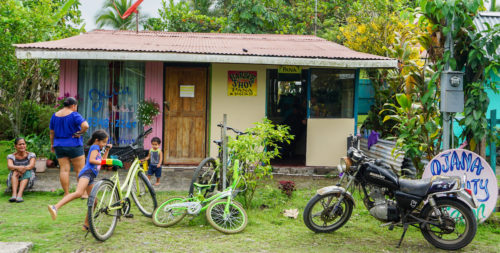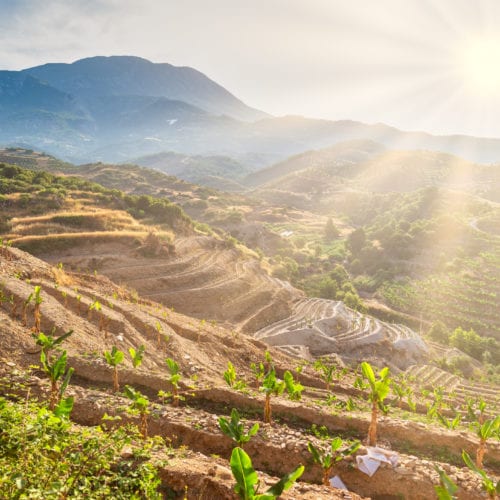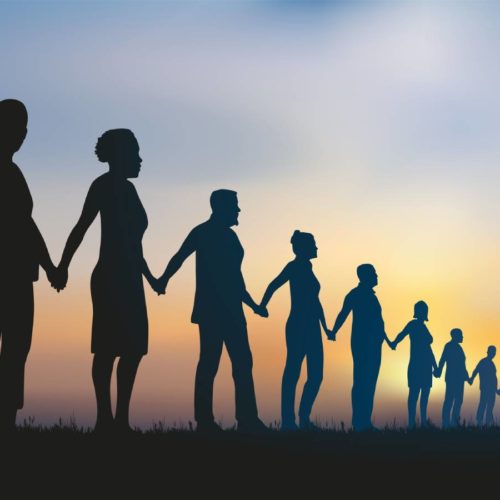Puerto Viejo, Costa Rica-February 2018: Street view of a small coastline town on the Caribbean coast with people walking on the narrow streets in the local neighbourhood living their everyday life.

Ensuring an Equitable Energy Transition
How the Caribbean Can Be a Model for a Resilient and Just Energy Future
In 2017, David Gumbs was huddled in his bathroom with his brother hoping to survive Hurricane Irma. Gumbs, who lives on the island of Anguilla, says that he was praying for his life. “I had never seen anything like it, and I have probably survived 10 hurricanes in my life,” he says. “The worst part is, I live in a fully concrete house, these houses are so expensive to build….and the house was shaking,” he adds. Gumbs was one of the lucky ones. Despite losing part of his roof, his house mostly stayed intact. However, many homes and schools on the island were leveled, and the hurricane caused about $190 million in damages across Anguilla.
Gumbs also happened to be the CEO of the Anguilla Electricity Company, and had to figure out how to restore electricity to the devastated island. Gumbs, who is now a principle on RMI’s Global South team, says that since Irma, he now thinks about resilience differently. “In Anguilla, although we had a system that provided energy for all, there are those who struggle to be on the system because they cannot afford it. Or they struggle because restoring infrastructure in their area might take longer than in other communities.”
David Gumbs (fourth from left) and some of the crew who helped to restore electricity on Anguilla after Hurricane Irma
Gumbs believes that if these more vulnerable communities have renewable microgrids, especially on critical facilities, it can relieve the stress of not having electricity after a disaster; people can charge their phones and have access to water and other essentials that they may not have otherwise.
This is only one of the important steps to take to ensure that as Caribbean islands transition to clean and resilient power, they do so in an equitable way. RMI’s recent report, Ensuring an Equitable Energy Transition: How the Caribbean Can Be a Model for a Resilient and Just Energy Future, lays out recommendations for how policymakers, utilities, and regulators can ensure that equity is embedded in every step of the energy transition.
The Importance of Including Equity
Caribbean island nations are on the front lines of climate change. At the same time, they are also first movers in carrying out the energy transition on a national scale. As such, they are poised to become global energy leaders, with a unique opportunity to “write the script” for modern energy system transition. However, this transition will not succeed if certain segments of society are left behind.
We define equity as the fair and just treatment of all people, demonstrated through the acknowledgement that systemically, individuals have vastly different access to opportunity and advancement. This may require providing individuals with different resources, systems, processes, and support to ensure they have equal opportunities to full, healthy lives.
In relation to the energy system, equity means sharing both the benefits and burdens involved in the production and consumption of energy services and including all affected people and communities in energy decision-making. And it means remediating social, economic, and health burdens on those historically underserved by the energy system.
Through interviews with representatives from government ministries and agencies, utilities, regulators, non-governmental organizations, and community members, we have come up with recommendations to help guide Caribbean electricity system stakeholders through the most important equity considerations of a clean energy transition.
The report includes case studies from Puerto Rico, Turks and Caicos, Belize, and the Bahamas that describe the importance of seeking and integrating the voices of communities, developing programs and policies based on the unique needs of communities, and developing financial mechanisms that help unlock credit for low-income communities.
A Critical Inflection Point
“The region’s energy systems stand at a critical inflection point,” says Justin Locke, managing director of RMI’s Global South program and one of the authors of the report. “Caribbean nations will be some of the first to transition to a clean, modern, distributed energy system at scale. As they prepare to implement comprehensive overhauls to energy infrastructure and governance systems, it is vitally important to incorporate equity.”
Gumbs agrees. “With the experiences I’ve had dealing with hurricanes and restoring the electricity grid, I have realized there are many things that we have to think about differently, and one is equity and the role it plays in the energy system,” he says. “We as island nations have to lead the way.”
Successfully implemented, Caribbean countries have an opportunity to serve as lighthouses by creating blueprints that incorporate climate equity principles that can be replicated in other isolated energy systems and by providing insight into continental-scale clean energy transition opportunities. Our hope is that other island nations, and in fact any nation transitioning to a cleaner, more resilient grid, will find the report useful to guide equity considerations in their energy transition.
Download Ensuring an Equitable Energy Transition: How the Caribbean Can Be a Model for a Resilient and Just Energy Future


